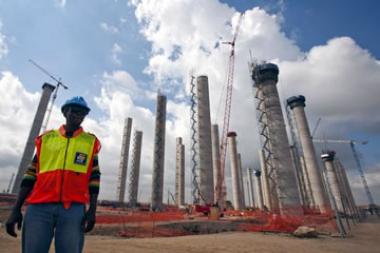Parliament passes Infrastructure Development Bill
 Infrastructure bill was born out of the Zuma administration’s commitment to focus on infrastructure as a central pillar of economic revival
Infrastructure bill was born out of the Zuma administration’s commitment to focus on infrastructure as a central pillar of economic revival
The National Assembly on Tuesday passed the Infrastructure Development Bill, which is meant to speed up implementation of strategic projects, with only the DA strongly opposing the draft law.
The bill was passed with 212 votes in favour and 55 against, a year after it was introduced in the legislature.
The Democratic Alliance’s Sej Motau argued that the bill’s weakness was placing too much power in the hands of the president to drive infrastructure projects, though he did not account directly to any parliamentary portfolio committee.
Motau said this could lead to large scale corruption when South Africa proceeded with expanding its nuclear energy quotient.
“It opens the space for another Nkandla-gate scandal,” he said.
The legislation will give statutory powers to a presidential infrastructure co-ordination commission, which includes the president and Cabinet ministers and premiers designated by him.
Economic Development Minister Ebrahim Patel disputed the DA’s argument, telling MPs that every single project would be subject to the approval of parliamentary oversight committees.
“One party could not resist to get into electioneering mode,” he said.
The legislation aims to fast-track regulatory decision-making time on infrastructure programmes to 57 days and to extend the state’s powers for expropriation of land needed for these.
Though the bill adheres to the legal requirements for expropriation set out in the Constitution, it states that where it is being contested the state will carry on with the project while the courts decide the outcome of the legal challenges.
The bill was born out of the Zuma administration’s commitment to focus on infrastructure as a central pillar of economic revival and its frustration with often long delays imposed by legal and regulatory hurdles to infrastructure development, for example those encountered by Eskom.
The DA routinely accuses the state of falling far behind on its infrastructure spending commitments and failing to meet the National Development Plan’s guideline of spending 10 percent of GDP on these projects.
“Despite the big talk, the Zuma government has consistently under-delivered on its infrastructure promises, and has been unable to spend the budgets allocated to this critical spending priority,” DA spokesman Tim Harris said this week.
Harris said the administration had failed to spend between 18 and 24 percent of its infrastructure budget, translating into some R293 billion, over six years.
















